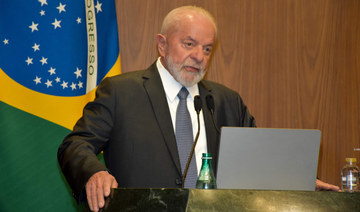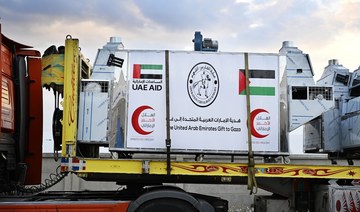SAO PAULO: During the 37th African Union Summit in Ethiopia, Brazil’s President Luiz Inacio Lula da Silva, who took part as a guest, took the opportunity to advance his South-South cooperation agenda, including in bilateral meetings with Arab leaders.
In those talks, he dealt both with urgent matters such as the Gaza war, and long-term partnerships.
After visiting Egypt, where he met with President Abdel Fattah El-Sisi and took part in an extraordinary session of the Council of the Arab League, Lula traveled to Addis Ababa, where he attended the summit and held private talks with several leaders, including Palestinian Prime Minister Mohammad Shtayyeh and Mohamed Al-Menfi, chairman of the Presidential Council of Libya.
On Saturday, Lula and Shtayyeh discussed Gaza and agreed that an immediate ceasefire must be declared in order to protect civilians.
Lula reaffirmed his government’s commitment to a two-state solution, and declared that humanitarian aid must reach the victims of the war.
Two days earlier, in Cairo, he had promised extra financial aid to the UN Relief and Works Agency for Palestine Refugees in the Near East, after a number of developed nations decided to stop funding it.
Shtayyeh thanked Lula for Brazil’s support to the Palestinian people, telling reporters after the meeting: “We’ll continue to work together. I’ve heard messages of encouragement, and that Brazil stands solid for peace and justice with international law.”
Emir Mourad, secretary-general of the Palestinian Confederation of Latin America and the Caribbean, said the face-to-face meeting between Lula and Shtayyeh strengthened ties between Brazil and Palestine, and is part of the president’s strategy for Middle East peace.
“Lula reiterated the key points of the Brazilian stance during the event in Africa, where several nations have a great identification with the plight of the Palestinians,” Mourad told Arab News.
The fact that Lula fiercely criticized Israel’s military operation against the Palestinians during an interview after the summit on Sunday, comparing it to the Holocaust, is a sign that his administration is willing to increase pressure on Israel until it stops the attacks, Mourad said.
“When there’s no clear solution in sight, one must take further steps. It’s a principle of diplomacy. That’s what Lula is doing now,” he added.
Lula’s visit to Egypt and his meeting with Shtayyeh demonstrate that he has a roadmap and is engaging in strategic discussions as part of it, Mourad said.
Before returning home, Lula met with Al-Menfi, who told him about the growing stability in Libya and asked him to reopen the Brazilian Embassy in Tripoli.
Brazil had maintained an embassy in Libya since 1974. But in 2014, amid growing instability in the country after the eruption of the civil war in 2011, Brazil moved its representation in Libya to Tunis.
Aline Rizzo, a historian who specializes in the South-South agenda, told Arab News that Lula “has several challenges ahead in his battle for multilateralism, but his trip to Africa and his meetings with Arab leaders show that’s the path he’ll follow.”
Last year, Brazil exported $451 million in products to Libya, especially animal protein and iron ore.
Ali Saifi, CEO of Cdial Halal, a halal certification company in Brazil, told Arab News that now is the right moment to reopen the Brazilian Embassy in Tripoli.
“We should be present there now that the nation is being restructured. We have much to offer in terms of food and building technology. Libya is a strategic country for Brazil,” he added.
Rizzo said the expansion this year of the BRICS bloc of developing economies is a favorable element for Lula to establish new partnerships with Arab countries, including in new sectors such as green energy.
“Lula has been repeatedly talking about climate challenges and producing clean energy together with other nations. My guess is that countries like Libya may be partners of Brazil in those new ventures,” she added, recalling that he mentioned such possibilities several times during his trip to Africa.




























